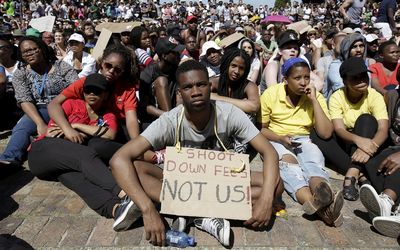STUDENT protests continued to shut campuses nationwide on Tuesday, with leaders of groups of protesters expected to hold briefings later in the afternoon.
The University of the Free State (UFS) on Monday was the latest institution to be hit by clashes between groups of students and supporters, when a Varsity Cup rugby match was disrupted by protesters, who were subsequently beaten and driven off the field.
UFS remains closed until Thursday, while #OutsourcingMustFall leaders and those of student groups are expected to address the media outside the Bloemfontein Magistrate’s Court at midday, where about 30 students are expected to appear.
Workers were reported to be protesting outside the gates of the main UFS campus on Tuesday,
UFS senior leadership condemned "in the strongest terms possible the violence against the protestors".
UFS’s statement on Monday warned that "nobody has the right to take the law into their own hands"‚ and said an "urgent investigation is underway‚ using footage from the event".
It also pointed to outside influences‚ claiming: "It is clear at this time that both the protesting group and the spectators included nonstudents in their number."
Classes suspended UP’s Hatfield campus
Classes at the University of Pretoria’s (UP’s) Hatfield Campus remained suspended until further notice after clashes on Monday.
Student groups had gathered to protest against Friday’s arrest of 27 people, sparking a tense standoff between groups of students protesting against the use of Afrikaans at the institution, and those defending it.
The university on Tuesday emphasised that it would "strictly" enforce an interdict against violent protest, with assistance from the police.
It said it had analysed Monday’s disruptions and "will be implementing university disciplinary processes as well as reporting all identified cases of violent and unlawful behaviour to the police for possible prosecution".
The 27 people arrested on Friday appeared in the Pretoria Magistrate’s Court on Monday. Charges against three of them were dropped, leaving 24 students to stand trial. The case was postponed.
The South African Student Congress Organisation (Sasco) is expected to brief the media later on Tuesday with regards to the renewed protests.
Public Protector Thuli Madonsela’s daughter, Wenzile Madonsela, told News24 on Monday that certain students at UP were targeted for arrest.
Ms Madonsela, the Economic Freedom Fighters’ general secretary at UP, said: "There was a list that was circulated of students who they (the university) wanted to be arrested. Those arrests were not by chance.
"They thought momentum would be gone with the arrests."
Ms Madonsela called on the university to withdraw the charges against the students. "Until the charges are dropped, we will continue to agitate and frustrate (the) campus," she said.
UWC outsourcing protest
At the University of the Western Cape (UWC), police on Monday were monitoring a worker protest against outsourcing.
A bin was set alight and a library had to be evacuated at UWC on Monday as cleaning and gardening staff protested against outsourcing and demanded a minimum wage of R10,000.
About 100 workers took part in the protest.
Michael Helu of the General Industries Workers Union of SA said workers were paid R2,700 a month by outsourced companies and needed more to survive.
While permanent employees of the outsourced companies working at the university received an additional R2,000 from UWC, this did not extend to those on temporary contracts, he said.
UWC executive management said the rector had met a delegation of outsourced cleaners and gardeners on Monday morning.
"They repeated their demands for immediate insourcing and a minimum wage of R10,000 per person per month.
"We reiterated our position that our precarious financial situation does not put us in a position to afford insourcing at a minimum wage of R10,000 per month."
The university also gave a study benefit to outsourced workers and that was "the best we can do at the moment, without compromising the future sustainability of the university".
"However, we have committed to look into the position of temporary cleaning and garden workers who have not received the additional R2,000 subsidy and the study benefit."
With News24 and TMG Digital

Last year’s student protests over fees and outsourcing have forced universities across the country to cut costs and find new ways to raise funds to help address the financial shortfall. Picture: REUTERS
STUDENT protests continued to shut campuses nationwide on Tuesday, with leaders of groups of protesters expected to hold briefings later in the afternoon.
The University of the Free State (UFS) on Monday was the latest institution to be hit by clashes between groups of students and supporters, when a Varsity Cup rugby match was disrupted by protesters, who were subsequently beaten and driven off the field.
UFS remains closed until Thursday, while #OutsourcingMustFall leaders and those of student groups are expected to address the media outside the Bloemfontein Magistrate’s Court at midday, where about 30 students are expected to appear.
Workers were reported to be protesting outside the gates of the main UFS campus on Tuesday,
UFS senior leadership condemned "in the strongest terms possible the violence against the protestors".
UFS’s statement on Monday warned that "nobody has the right to take the law into their own hands"‚ and said an "urgent investigation is underway‚ using footage from the event".
It also pointed to outside influences‚ claiming: "It is clear at this time that both the protesting group and the spectators included nonstudents in their number."
Classes suspended UP’s Hatfield campus
Classes at the University of Pretoria’s (UP’s) Hatfield Campus remained suspended until further notice after clashes on Monday.
Student groups had gathered to protest against Friday’s arrest of 27 people, sparking a tense standoff between groups of students protesting against the use of Afrikaans at the institution, and those defending it.
The university on Tuesday emphasised that it would "strictly" enforce an interdict against violent protest, with assistance from the police.
It said it had analysed Monday’s disruptions and "will be implementing university disciplinary processes as well as reporting all identified cases of violent and unlawful behaviour to the police for possible prosecution".
The 27 people arrested on Friday appeared in the Pretoria Magistrate’s Court on Monday. Charges against three of them were dropped, leaving 24 students to stand trial. The case was postponed.
The South African Student Congress Organisation (Sasco) is expected to brief the media later on Tuesday with regards to the renewed protests.
Public Protector Thuli Madonsela’s daughter, Wenzile Madonsela, told News24 on Monday that certain students at UP were targeted for arrest.
Ms Madonsela, the Economic Freedom Fighters’ general secretary at UP, said: "There was a list that was circulated of students who they (the university) wanted to be arrested. Those arrests were not by chance.
"They thought momentum would be gone with the arrests."
Ms Madonsela called on the university to withdraw the charges against the students. "Until the charges are dropped, we will continue to agitate and frustrate (the) campus," she said.
UWC outsourcing protest
At the University of the Western Cape (UWC), police on Monday were monitoring a worker protest against outsourcing.
A bin was set alight and a library had to be evacuated at UWC on Monday as cleaning and gardening staff protested against outsourcing and demanded a minimum wage of R10,000.
About 100 workers took part in the protest.
Michael Helu of the General Industries Workers Union of SA said workers were paid R2,700 a month by outsourced companies and needed more to survive.
While permanent employees of the outsourced companies working at the university received an additional R2,000 from UWC, this did not extend to those on temporary contracts, he said.
UWC executive management said the rector had met a delegation of outsourced cleaners and gardeners on Monday morning.
"They repeated their demands for immediate insourcing and a minimum wage of R10,000 per person per month.
"We reiterated our position that our precarious financial situation does not put us in a position to afford insourcing at a minimum wage of R10,000 per month."
The university also gave a study benefit to outsourced workers and that was "the best we can do at the moment, without compromising the future sustainability of the university".
"However, we have committed to look into the position of temporary cleaning and garden workers who have not received the additional R2,000 subsidy and the study benefit."
With News24 and TMG Digital




















Change: -0.47%
Change: -0.57%
Change: -1.76%
Change: -0.34%
Change: 0.02%
Data supplied by Profile Data
Change: -1.49%
Change: 0.07%
Change: -0.47%
Change: 0.00%
Change: 0.04%
Data supplied by Profile Data
Change: 0.43%
Change: 1.19%
Change: 0.66%
Change: 0.15%
Change: 1.17%
Data supplied by Profile Data
Change: 0.06%
Change: -0.63%
Change: 0.00%
Change: -1.40%
Change: -0.87%
Data supplied by Profile Data